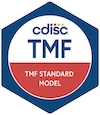
Trial Master File (TMF) is the gold standard for organizing, managing, and exchanging the essential documentation underpinning every clinical trial.
The TMF Standard (formerly TMF Reference Model) provides a unified, standardized structure and terminology that streamlines regulatory compliance, enhances audit readiness, and facilitates seamless collaboration across sponsors, investigators, and regulatory bodies.
By adopting the TMF Standard Model, organizations can reduce inefficiencies, minimize risk, and accelerate trial timelines - ultimately driving greater confidence in the quality and integrity of clinical research data. This makes the TMF not just a compliance tool, but a strategic business enabler that supports innovation, transparency, and global harmonization in clinical research.
The TMF Community joined CDISC in April 2022, becoming a cornerstone of CDISC’s commitment to global harmonization in clinical research. The TMF Standard is maintained by a dedicated team of industry volunteers through sub-groups focused on development and continuous improvement. Quarterly General Meetings and ongoing working groups provide opportunities for engagement, and individuals interested in shaping the future of TMF standards are encouraged to Join CDISC, Volunteer, and Participate in Interchanges.
TMF - Frequently Asked Questions
The TMF Standard Model provides standardized taxonomy and metadata and outlines a reference definition of TMF content using standard nomenclature. The TMF Standard Model is not intended to be taken and used “off-the-shelf” but can be adapted to an electronic or paper TMF, and does not endorse, nor require, any specific technology for application. Organizations are under no obligation to adopt the TMF Standard Model.
It should be noted that we use the words “standard” and “standardized” in their general sense* and NOT to imply the creation of a formal, enforceable standard.
The TMF Standard Model is a valuable tool for:
Biopharmaceutical sponsors of any size, both commercial and institutional, involved in clinical studies
Clinical study team members, including trial and data management, clinical supplies, biostatistics, etc.
Contract Research Organizations and vendors servicing TMFs, including technology providers
TMF consultants
Site staff, including investigators and coordinators
Regulators who wish to overcome the challenges of different TMF terminology and file structures that create inefficiency and a higher degree of variability during sponsor audits
Biopharmaceutical sponsors of any size, both commercial and institutional, involved in clinical studies
Clinical study team members, including trial and data management, clinical supplies, biostatistics, etc.
The TMF Standard Model initiative was formerly a sub-group of the Document and Records Management Community of the Drug Information Association (DIA). Since June 2022, it has become part of CDISC, based on the position paper found here. The TMF Standard Model initiative is governed by the rules and procedures of CDISC but the work products are a Public Domain work. The CDISC TMF Standard Model Initiative Charter can be found here.
There are in excess of 1,500 individuals who have been members of the TMF Standard Project team, from over 280 different organizations and over 30 countries globally. The membership profile includes biopharmaceutical clinical trial sponsors, non-commercial trial sponsors, CROs, service vendors, technology vendors, consultants, and non-profit organizations. Of course, not everyone contributes but by being a member they receive regular emails containing information updates, can participate in our collaboration platform, and have the opportunity to contribute if they so wish. Since its inception in 2009, the TMF Standard Model initiative has received specific contributions from over 400 individuals globally. The latest major release (v3) involved around 110 individual members who worked on 15 sub-teams over a period of around 9 months and we have within our records the details of who those specific individuals are. We also retain a copy of the attendees’ list for each project team meeting we hold. Whilst we have no intention to be secretive, we do not publish the list of contributors for data privacy reasons; release of member information would put us in breach of data privacy laws. In addition, some members participated as individuals whilst others participated as an official representative of their employer and we do not have permission of those employers to publish company contributor details.
The initiative is overseen by a Steering Committee which is democratically elected by the members. Any registered member who has been involved on one or more project teams in the last 12 months can put themselves forward for a position on the Steering Committee as 3-year positions become vacant. The activities are governed by a published Charter.
Some shortcomings of the TMF Standard Model have been voiced but these are mostly based on the premise that the Standard Model is a formal standard based on published vocabularies and that it is intended to be used as a data or document exchange tool. Neither of these assertions are correct. As a standard model, the tool has proven to be extremely valuable. A survey conducted by this initiative in 2022 showed that 96% of eligible respondents are currently using the Model. It is based upon ICH vocabulary, ICH regulatory requirements, and commonly accepted principles for TMF management. The authors of the Model are, in general, experienced TMF managers from sponsor companies, CROs, non-commercial organizations, and TMF vendors; experts in TMF management from in excess of 250 different organizations.
We are very proud that the discussion forum, LinkedIn group, and this website contain uncluttered useful information and discussions. When members use these facilities to interact with other members we ask that the following rules are respected:
No job postings at all
No recruitment
No company advertising, which includes company-specific ‘advertorial’ postings and promotions embedded in email signatures
No conference, webinar, or blog advertising, including links to these
No advertising in responses to discussions
There are plenty of places for people to advertise their companies, including webinars and other events, but this just isn’t one of them! But members should feel free to share any interesting information or pose any challenges or questions around TMFs and eTMFs.
However, one of the values of having such a network of peers is to share information about bona fide educational events. In this regard, the Steering Committee may promote through its meetings, group communications, the TMF Standard Model website conferences, and other educational events that will be of interest to colleagues working with trial master files. Events will NOT be promoted that:
are ‘advertorial’ in nature
are run for a member’s commercial interest or financial gain; or
promote a specific company, vendor, or technology/services solution.
Typically, events that may be promoted by the Steering Committee include industry conferences and educational offerings from professional associations and other not-for-profit organizations. Please contact a Steering Committee member if you become aware of an event that might be of interest to others and we will share the information if it is appropriate to do so.
It can be retrieved for free HERE.
You can join our regular project meetings. These are usually held every six weeks at 8 AM PT, 11 AM ET, 4 PM UTC, 5 PM CET. You just need to register here to receive the schedule and dial-in details for these meetings.
If you want to actively participate in the development of the Model or any of the supporting tools, you are welcome to join the project…. but this is only for those who have the time to participate and join a team!
TMF Resources
The CDISC TMF Steering Committee comprises 16 people who are elected* by registered members of the Project Team. Only those actively participating during the preceding year in official working groups of the TMF Project are entitled to vote in elections. Steering Committee members serve three-year terms which are set-up so that around a third of the Committee stands down each year. The Steering Committee is governed by the Steering Committee Charter.
Current members of the Committee are:
| Name | Company |
| Dawn Niccum | Inseption |
| Donna Dorozinsky | Just In Time GCP |
| Gillian Gittens | Transperfect |
| Jamie Toth | BeOne Medicines USA Inc. |
| Jim Horstmann | Veeva |
| Joanne Malia | Regeneron |
| Karen Roy | KJRoy Consulting |
| Lisa Mulcahy | Mulcahy Consulting |
| Paul Fenton | Montrium |
| Suzanne Turner | Ice Consulting |
| Wendy Trimboli | Acadia Pharmaceuticals |
| Bryan Souder | Merck |
| Liz Farrell | Agios |
| Richard Shore | Eraneos |
| Rob Jones | Arithmos |
| Nick Hargaden | Merus |
| Kathleen Mellet | TMF SM SC Support |
The Steering Committee has been established so that about a third of members have their term of office expiring each year. About 6-8 weeks before these terms expire, a call will be sent out to members of the Standard Model Project asking for self-nominations. A strict deadline will be included in the notification. Sometimes, the call for nominations may also be circulated via our mailing list to ensure everyone sees the request but nominations are limited to members who have been involved on the project during the previous 12 months i.e. those registered and active as a CDISC volunteer. So, you may have lots of enthusiasm and experience in the TMF world and might even regularly join our general meetings, but if you’ve not been registered as a volunteer during the previous 12 months, you’ll not qualify to be nominated for the Steering Committee. As detailed elsewhere on this site, volunteering is for people who are willing and have the time to participate in our activities. We think it is important and fair that if you want a say in how the project operates, you need to have at least 12 months of recent experience working with us. So, if you meet these criteria and you submit your nomination before the deadline, you’ll be accepted onto the list of candidates for vacant positions.
*Elections are conducted on a ‘first past the post‘ basis, with candidates receiving the most votes filling the vacancies available. However, the Charter limits the committee member composition for any one sector or voting block (e.g. BioPharma, CRO, Vendor, Consultant) to no more than 50% of the committee. If voting results in this 50% limit being reached, any further candidates from that block will be unable to take up a position irrespective of the number of votes cast for them. In these circumstances, candidates from other blocks with the next highest number of votes cast will join the committee.
| Name | Company |
| Bryan Souder | Merck |
| Colleen Butler | Syneos Health |
| David Ives | Novartis |
| Dawn Niccum | Inseption |
| Donna Dorozinsky | Just In Time GCP |
| Jamie Toth | Beigene |
| Joanne Malia | Regeneron |
| Lisa Mulcahy | Mulcahy Consulting |
| Paul Carter | Montrium |
| Sarah Dean | Precision for Medicine |
| Sarah Hitching | Hedian |
| Steph Viscomi | Apellis Pharmeceuticals |
A TMF Forum is available for raising and answering questions around the TMF Standard and TMF Management. Any member of the public can see the content of the online forums, including all topics and all replies. To post a topic or a reply you have register as a user on the Forum website. Do not use this facility as a marketing tool or to promote conferences, events, etc. It should be restricted to conversations about TMF Management and the TMF Standard Project ONLY.
TMF Forums
The Fundamentals of the TMF Standard training focuses on how the TMF Standard can be utilized to improve TMF Management. Starting with the basics of the TMF Standard itself, the training walks through the importance of people, process, and technology, setting up a TMF, performing QC, developing oversight approaches, and finally, surviving the dreaded inspections!
Student Feedback:
- The history and background of the TMF Standard was very helpful to provide some grounding on the topic.
- The interactive activities were a plus, as well as the instructor's answers to the questions raised during the presentations.
- The course contained a wealth of information including resources to the available references regarding TMF management. I really enjoyed applying what was discussed during the group exercises. It was also a wonderful networking opportunity.
- As someone with little TMF experience, the training made the model far less overwhelming and easier to understand the various pieces.
- The collaborative workshops and discussions allowed for debate about real-life scenarios and solutions.
- The instructor spoke from deep knowledge on the subject and gave good answers to all the asked questions.
- The sessions were interactive and gave great room for discussions. As someone relatively new to TMF in an academic setting, the review of the standard model, the regulations around it, and how to manage and implement the model was exactly what I needed. I have so many thoughts and ideas to take back to my team to improve our TMF oversight. This was an EXCELLENT course that would encourage anyone involved in TMF to take!!
Co-authored by Scientific Archivists Group (now HSRAA), TMF Standard Model and Pocket EDMS, March 2017
Provide Feedback or Ask a Question
We welcome your feedback on the CDISC TMF Risk Initiative Tool and White Paper. Use this form to share your questions, suggestions, or comments.
The TMF Standard Model LinkedIn Group is an active place for discussions and announcements. It is strictly monitored according to the following rules:
No job postings
No recruitment
No company advertising, which includes company-specific ‘advertorial’ postings and promotions embedded in email signatures
No vendor-specific conferences, webinars, or blog advertising, including links
No advertising in responses to discussions
Investigator Site File (ISF) Structure Version 1.0 (ISFSV1)
About the ISF
At the sponsor level, a standardized reference for organizing and storing study related documentation exists, called the Trial Master File (TMF) Standard Model. This standard has supported efficiency and transparency across the sponsor side of the industry. However, sites did not have an industry-recognized standard reference for their documentation, which amounts to inconsistent site document organization and inefficient translatability of site documents to the sponsor TMF.
- The clinical research industry will benefit in many ways from having a standardized investigator site file (ISF), such as:
- Take the guess work out of required documentation through consistent structure, file naming conventions, etc.
- Help sites maintain complete and current research documentation.
- Decrease duplication of work so sites aren’t providing the same record multiple times.
- Prevent misfiled records since file locations would be the same.
- Decrease mislabeling errors since naming conventions would be the same.
- Make audits and inspections efficient.
- Simplify training for staff.
To address this, CDISC has developed the ISF Structure Version 1.0, which aims to provide sites with a way to be organized and consistent, a way to have clarity by showing which record goes where, a way to show compliance with regulations and guidelines, and a way to be inspection ready. It will also provide sponsors with a way to have ISFs align with their TMFs, translating into healthy, complete, and up to date trial master files. The ISF Structure will also improve communication in the industry since everyone will now have a shared understanding with a common goal. Features of ISFSV1: A logical structure aligned to the TMF Standard Model 3.3.1
A User Guide will be released in the near future


